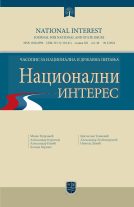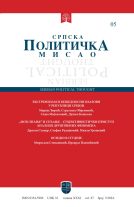- Home page
- Researchers
- Ilija Kajtez
Ilija Kajtez

THE NEED FOR PHILOSOPHY IN THE (POST)MODERN WORLD
To think about essential questions, the meaning of human existence, social-historical and ontological riddles of the World, necessarily means being in the chambers of philosophy. Unfortunately, our (post)modern, globalized and busy world is turning its back on the wisdom of all ages. In this paper, the authors point to the rejection of philosophy in the modern consumer society and search for answers to questions about the need to study philosophy today. Also, about its importance for man, people and humanity. The work consists of three parts, in which a contribution is made to the understanding of the importance of philosophy for man, society and humanity. The authors pointed the reasons for the rejection of philosophy in the modern age are explored, and the relationship between philosophy and science is examined. Philosophy is needed by modern man/society/humanity for the same reasons it was needed in the past, but the need for it is hidden in modern consumer society. Philosophy is eternal and everlasting. If the root of philosophy is about 27 centuries deep and has survived all radical changes in the world and all (r)evolutions, rulers and dynasties, political and social movements, all wars and destructions, all geographical discoveries and the exploring of the Cosmos, is it wise to voluntarily deny such a deep source of wisdom? In contrast to today's consumer lost in his own life, philosophy gives us an insight that can be healing and beneficial. But we should have a fruitful conversation with philosophy, but not just have a historical retrospective. Because we who are still alive need philosophers and their wisdom of the ages. A philosopher looks for the essential and the necessary in everything, and this separates him from those people who deal with unimportant things, phenomena and processes. Of course, a philosophically minded person never underestimates the knowledge and meaning of exact sciences and techniques and technical progress. Communicating with the wisdom of the ages is both healing and valuable and benefits both the individual and the community to which he or she belongs.

JUSTIFICATION OF MILITARY NEUTRALITY OF THE REPUBLIC OF SERBIA AT A TIME OF EROSION OF NEUTRALITY IN EUROPE
This paper aims to examine the justifiableness of the Republic of Serbia’s politics of military neutrality after the beginning of the Russo-Ukrainian conflict, i.e., in an era of extreme tensions between Western countries and Russia. The significance of this topic has been additionally elevated after two neutral countries, Sweden and Finland, renounced neutrality while debates about the appropriateness of neutrality emerged in other neutral countries, such are Ireland, Malta, and Austria. The purpose of the paper is to examine, from a perspective of sociology of politics, whether the position of military neutrality still represents a good foreign-policy strategy aiming to preserve sovereignty and territorial integrity. The hypothesis of this paper is that Serbia’s military neutrality is justified by the social reality in Serbia.
The first chapter briefly describes the historical decline of neutrality during the first half of the 20th century. In that context, observation made in mid last century, according to which neutrality was becoming an obsolete concept, is true. Increase of NATO members, as well as abandoning neutrality under the influence of globalization and negative experiences of neutral countries in the 20th century, strengthens this assertion. However, we can conclude that neutrality has existed in continuity in Europe throughout the entire modern period of history, and that there were always some states that chose neutrality, with larger or lesser prospects of success in realization of their security interests. The great revolution, one might say the collapse of neutrality or even a frenzy to align, was the result of the Russo-Ukrainian conflict and new increasing tensions between the West and Russia.
The second chapter is dedicated to the causes of Serbia’s decision to be military neutral. These causes include: internal division of key political acters in regards to strategic alignment, the issues of the status of Kosovo and Metohija in which the Russian Federation provides key support to Republic of Serbia in the United Nations, and the role of NATO in wars during the disintegration of Yugoslavia and currently in Kosovo and Metohija.
The third chapter lists the advantages in regards to social values implied by the position of military neutrality. Authors conclude that military neutrality represents a favorable strategic option for the Republic of Serbia, not just due to painful collective memory of Serbian citizens of the NATO aggression on Yugoslavia and the support of the Russian Federation to Serbia in regards to Kosovo and Metohija, but also due to the intrinsic values of neutrality which could become an identity attribute and a foundation of the renewal of solidarity in Serbian society.
